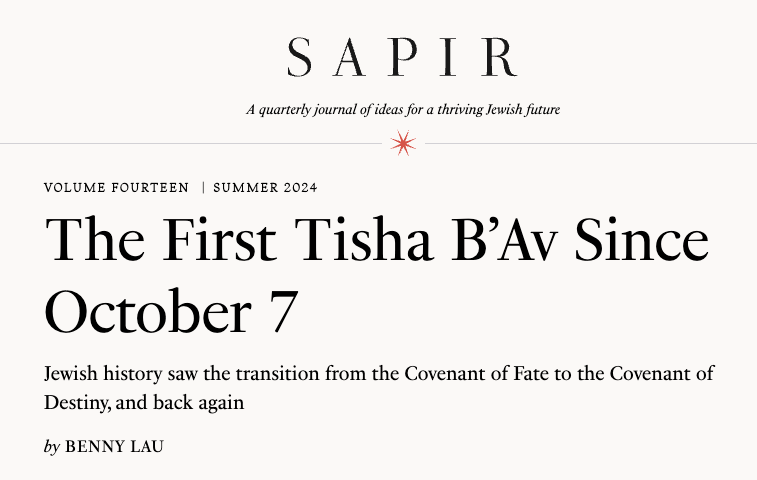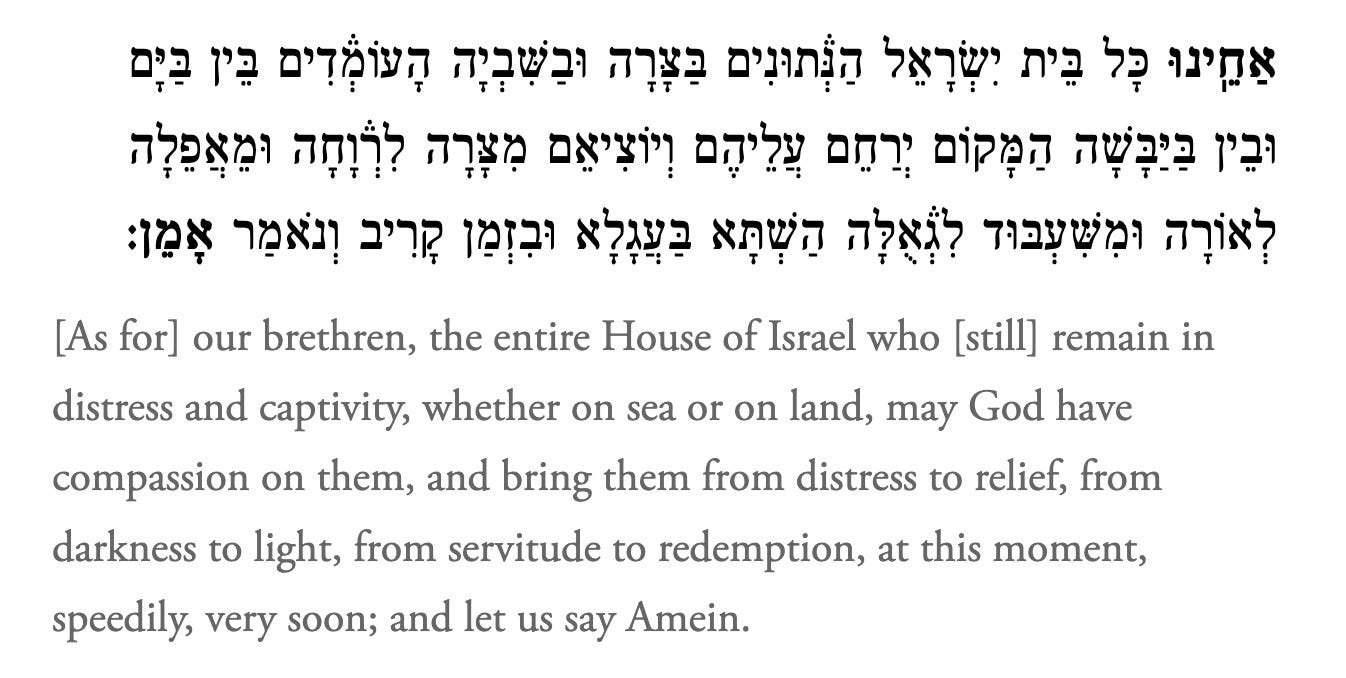This is supposed to be the moment that our souls heal.
The period after Tisha B’Av is known as the sheva shabbatot nechemta, the Seven Weeks of Consolation. They are the seven weeks between Tisha B’Av and Rosh HaShannah, where the prophetic readings on Shabbat morning are meant to console, to bring hope, to prepare us for new beginnings with Rosh Hashanah.
Yet we already know that Rosh Hashanah is going to be rough this year. It will fall only a few weeks before Simchat Torah, the Jewish anniversary of October 7. Will we still be at war a year later? Will we have brought the hostages back? Will we have the same leadership—political and military—that failed us and got us into this crisis? None of us knows, but many of us have our suspicions.
The infighting of 2023 is back, full throttle. Just last night, the news was filled with
scenes of Haredi men assaulting and taunting other Haredi men who were trying to get drafted (the draftees had to be protected by elite police units),
a clip of a young boy released from Hamas captivity who told of people writing him on social media “It’s too bad you didn’t die there, along with all the other children” (because he has voiced his support for a deal to free the hostages, a deal that many oppose),
A report that Bibi is demanding that Gantz repay 70K NIS for a work trip that he took that wasn’t authorized, even though government ministers and their spouses are flitting around the world for purposes much less obviously connected to work
and more. Pettiness and meanness, everywhere one looks.
But there was also a report about the many thousands of people who’d never met or heard of Jordan Cooper, a soldier from LA who served 200 days in reserved but then died of an allergic reaction to food—thousands of people who show up from all over, simply because the family asked them to. They were overwhelmed beyond words by the response.
So it is, as Charles Dickens said long ago, something akin to “the best of times and the worst of times.”
How are we to make sense of this period in Jewish history? From where should Israelis find hope, reason to believe in a future, ways of understanding what has happened and where we are? Today, at the beginning of this period of Seven Weeks of Consolation, we share two voices. One is well known, one is not. One is a rabbi, one is not. In this case, one wrote in an English journal, one gave a speech in Hebrew. One is a bit older, one is a bit younger. One is male, one is female.
What they have in common, though, is that they are helping us put the events of today into the context of the history of the Jewish people, reminding us that we are not a people of the story of 2023-2025, but a people of thousands of years of history. We’ve been here before, we’ll be here again. The question is how we make meaning out of this painful moment, and learn from it how to move forward.
We begin with a piece by Rabbi Benny Lau, which appeared this week in SAPIR MAGAZINE, to my mind one of the very finest publications in English covering the world Jewish ideas.
Rabbi Lau is one of the most respected rabbis in the modern Orthodox Israeli world, and one of the most fascinating rabbinic minds in Israel, who among much else, runs the 929 Bible study project.
In The First Tisha B’Av Since October 7th, he evokes Rabbi Soloveitchik’s notions of Covenant of Fate and Covenant of Destiny. Until this year, he says, we’d believed that we’d moved from being a people of the Covenant of Fate to a people of a Covenant of Destiny. But now, he says, we’ve been turned back to the former:
The Covenant of Fate expressed the existence of the Jewish people as a persecuted minority in the lands of the Diaspora, beholden to the choices and external powers around them. It was a mode of survival built on a common memory of powerlessness.
The Covenant of Destiny was configured around the opposite: power and agency, the will to express the Jewish experience through a national mission, unencumbered by external powers, seeking to realize its special role in history as a member in the family of nations, to be an am segula, a term often translated as a “treasured nation,” but more accurately, a “dignified one.”
…
On October 7th, he says
In an instant, the post-exilic winds, both east and west, stopped. There we were, thrown from the messianic age back into the feeling of exile, standing still with trembling hearts — seemingly from the Covenant of Destiny back to the Covenant of Fate.
Where should we go from here? I urge you to read Rabbi Blau’s brief but moving essay. And sign up to get Sapir’s future publications.
In addition to Rabbi Blau, we’re sharing a brief video by Orit Mark Ettinger.
Orit is a lecturer, a social activist, and the Founder and CEO of Or Michael, which she founded after she lost her father, Michael Mark, in a terror attack in 2016. Or Michael is a group of volunteers who go to hospitals throughout Israel to bring people moments of joy and music.
In 2019, Orit lost her older brother after he had served in the Mossad, and on October 7, Orit’s cousin, Elchanan Kalmanson was killed by terrorists as he rescued people from Kibbutz Be’eri. Just weeks later, on October 31, Lt. Pedayah Menachem Mark, Orit’s younger brother, was killed in the northern Gaza Strip.
Despite this cascade of losses, Orit has moved thousands of Israelis with her take on Jewish peoplehood, and her beliefs about how we need to respond to this moment.
We hope you find Orit’s words (in the video below) just as powerful and inspiring as we and thousands of other Israelis have—this speech was even featured on the nightly news last night. (We’ve added English subtitles to the video she posted on Youtube.) For those who are interested, here is a link to Orit’s website. The original post of her video (without the English subtitles) is here.

















Voices searching for faith and meaning, even in desperate times